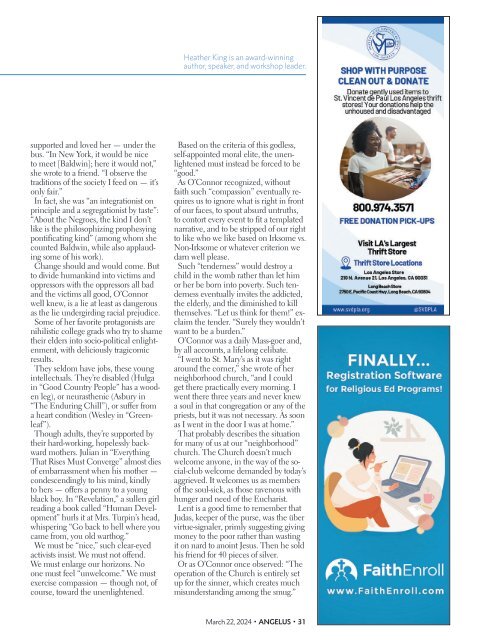Angelus News | March 22, 2024 | Vol. 9 No. 6
On the cover: To cap off a nearly five-decades-long career working in Church communications, Francis X. Maier had an ambitious book idea: a ‘snapshot’ of the Church in America at this time in history that captured both its strengths and its sicknesses. On Page 10, Maier shares what he took away from hearing more than 100 “confessions”’ with American Catholic leaders for the project. On Page 20, John L. Allen Jr. offers his own diagnosis of the uneasy relationship between U.S. Catholics and Rome during the Pope Francis pontificate.
On the cover: To cap off a nearly five-decades-long career working in Church communications, Francis X. Maier had an ambitious book idea: a ‘snapshot’ of the Church in America at this time in history that captured both its strengths and its sicknesses. On Page 10, Maier shares what he took away from hearing more than 100 “confessions”’ with American Catholic leaders for the project. On Page 20, John L. Allen Jr. offers his own diagnosis of the uneasy relationship between U.S. Catholics and Rome during the Pope Francis pontificate.
Create successful ePaper yourself
Turn your PDF publications into a flip-book with our unique Google optimized e-Paper software.
Heather King is an award-winning<br />
author, speaker, and workshop leader.<br />
supported and loved her — under the<br />
bus. “In New York, it would be nice<br />
to meet [Baldwin]; here it would not,”<br />
she wrote to a friend. “I observe the<br />
traditions of the society I feed on — it’s<br />
only fair.”<br />
In fact, she was “an integrationist on<br />
principle and a segregationist by taste”:<br />
“About the Negroes, the kind I don’t<br />
like is the philosophizing prophesying<br />
pontificating kind” (among whom she<br />
counted Baldwin, while also applauding<br />
some of his work).<br />
Change should and would come. But<br />
to divide humankind into victims and<br />
oppressors with the oppressors all bad<br />
and the victims all good, O’Connor<br />
well knew, is a lie at least as dangerous<br />
as the lie undergirding racial prejudice.<br />
Some of her favorite protagonists are<br />
nihilistic college grads who try to shame<br />
their elders into socio-political enlightenment,<br />
with deliciously tragicomic<br />
results.<br />
They seldom have jobs, these young<br />
intellectuals. They’re disabled (Hulga<br />
in “Good Country People” has a wooden<br />
leg), or neurasthenic (Asbury in<br />
“The Enduring Chill”), or suffer from<br />
a heart condition (Wesley in “Greenleaf”).<br />
Though adults, they’re supported by<br />
their hard-working, hopelessly backward<br />
mothers. Julian in “Everything<br />
That Rises Must Converge” almost dies<br />
of embarrassment when his mother —<br />
condescendingly to his mind, kindly<br />
to hers — offers a penny to a young<br />
black boy. In “Revelation,” a sullen girl<br />
reading a book called “Human Development”<br />
hurls it at Mrs. Turpin’s head,<br />
whispering “Go back to hell where you<br />
came from, you old warthog.”<br />
We must be “nice,” such clear-eyed<br />
activists insist. We must not offend.<br />
We must enlarge our horizons. <strong>No</strong><br />
one must feel “unwelcome.” We must<br />
exercise compassion — though not, of<br />
course, toward the unenlightened.<br />
Based on the criteria of this godless,<br />
self-appointed moral elite, the unenlightened<br />
must instead be forced to be<br />
“good.”<br />
As O’Connor recognized, without<br />
faith such “compassion” eventually requires<br />
us to ignore what is right in front<br />
of our faces, to spout absurd untruths,<br />
to contort every event to fit a templated<br />
narrative, and to be stripped of our right<br />
to like who we like based on Irksome vs.<br />
<strong>No</strong>n-Irksome or whatever criterion we<br />
darn well please.<br />
Such “tenderness” would destroy a<br />
child in the womb rather than let him<br />
or her be born into poverty. Such tenderness<br />
eventually invites the addicted,<br />
the elderly, and the diminished to kill<br />
themselves. “Let us think for them!” exclaim<br />
the tender. “Surely they wouldn’t<br />
want to be a burden.”<br />
O’Connor was a daily Mass-goer and,<br />
by all accounts, a lifelong celibate.<br />
“I went to St. Mary’s as it was right<br />
around the corner,” she wrote of her<br />
neighborhood church, “and I could<br />
get there practically every morning. I<br />
went there three years and never knew<br />
a soul in that congregation or any of the<br />
priests, but it was not necessary. As soon<br />
as I went in the door I was at home.”<br />
That probably describes the situation<br />
for many of us at our “neighborhood”<br />
church. The Church doesn’t much<br />
welcome anyone, in the way of the social-club<br />
welcome demanded by today’s<br />
aggrieved. It welcomes us as members<br />
of the soul-sick, as those ravenous with<br />
hunger and need of the Eucharist.<br />
Lent is a good time to remember that<br />
Judas, keeper of the purse, was the über<br />
virtue-signaler, primly suggesting giving<br />
money to the poor rather than wasting<br />
it on nard to anoint Jesus. Then he sold<br />
his friend for 40 pieces of silver.<br />
Or as O’Connor once observed: “The<br />
operation of the Church is entirely set<br />
up for the sinner, which creates much<br />
misunderstanding among the smug.”<br />
<strong>March</strong> <strong>22</strong>, <strong>2024</strong> • ANGELUS • 31

















